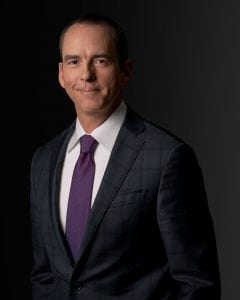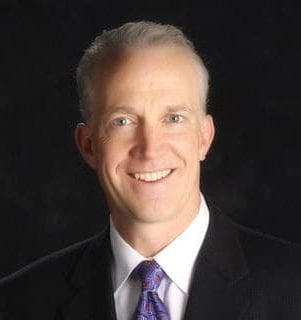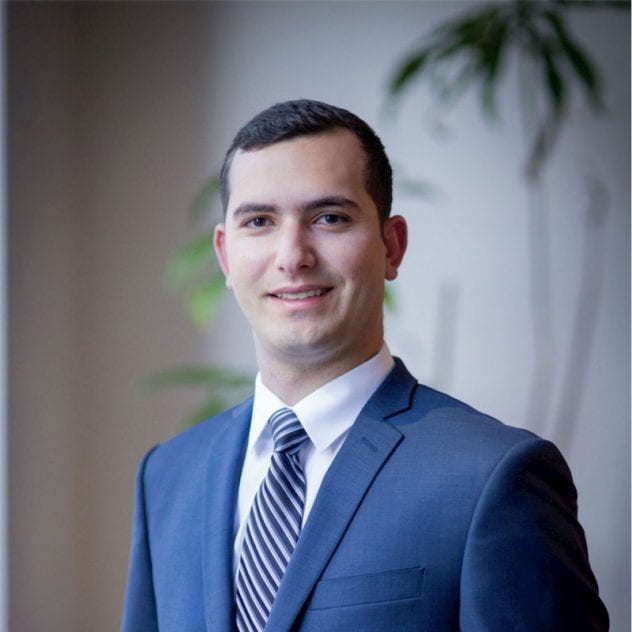 In the thirty years since Phil Canfield graduated from the University of Texas with degrees in Business Honors and Finance, much has changed in the world, in Austin, and on our campus. We begin our conversation discussing the increasing number of hipsters in the city (we are meeting during SXSW, after all) and then move into talking about the dynamic relationship between artificial intelligence and business. Despite this rapid evolution, Mr. Canfield agrees that one thing has remained constant: The caliber of the Business Honors Program and the benefit of receiving a Business Honors degree.
In the thirty years since Phil Canfield graduated from the University of Texas with degrees in Business Honors and Finance, much has changed in the world, in Austin, and on our campus. We begin our conversation discussing the increasing number of hipsters in the city (we are meeting during SXSW, after all) and then move into talking about the dynamic relationship between artificial intelligence and business. Despite this rapid evolution, Mr. Canfield agrees that one thing has remained constant: The caliber of the Business Honors Program and the benefit of receiving a Business Honors degree.
“The BHP was a small group within a large university, which allowed for teamwork and the ability for us to have a small cohort of really bright students that I could work with, learn from, test ideas out, and play ideas off of each other. It was seamless going from that environment to sitting at a desk at Kidder, Peabody, and Co. working on financial models and being part of a deal team,” Mr. Canfield shares. Throughout our conversation, we keep coming back to this theme of the strong relationships students build with each other through their time in the program. He believes these tightknit relationships are one part of what make the honors program unique. “It’s not just the friendships, it’s also learning how to work with other people,” he says. “Also, the faculty. Those are the two things that make a great learning experience: A great group of engaged students whom you know and build relationships with combined with a faculty that pushes you, teaches you things that perhaps weren’t intuitive, that surprise you, and importantly, a faculty that is doing research in areas that are going to be important for the future.”
Mr. Canfield vividly remembers being pushed and challenged in his honors classes. When asked about his favorite memory, he laughs and says he doesn’t have a favorite memory, but he definitely has a class that he remembers the most. “I think everybody who comes to BHP is used to making A’s. So, we had this Operations Research class, and I remember about 4 weeks into the class, I was sitting with my group of 5 or 6 friends that we studied with and 2 or 3 of them really got it in a way that I didn’t. And I realized that I wasn’t going to get it. It was the only class at UT in my entire 4 years where I said, ‘You know what, I think I’m shooting for a B in this class.’ And it’s so funny because I think about that all the time; it’s the only time I’ve ever just stepped back and said, ‘Wow, there’s something about the way that they think that’s different than the way I think. This makes sense to them and this is really hard for me.’”
Mr. Canfield believes the difficulties that honors students face together, like challenging courses, are what allow the close friendships to form. “BHP is an intense program. Any time a group of people go through something with that intensity together, they create a bond. The great thing about bonds like that is they really stand the test of time.” As an example, he recalls calling his BHP peers when it came time for him to think about what he was going to do after his first two years in investment banking. “It was useful for me to be able to call friends of mine who I had this shared experience with,” he says. “At the time, most people only worked for two years and then went and got an MBA, and I was thinking about not doing that. That’s a big decision, it’s the kind of decision where there aren’t that many people you can really talk to about it.”
After two years at Kidder, Peabody, and Co., Mr. Canfield joined GTCR, a private equity firm. After two years as an associate there, he started thinking about getting his MBA. “At the time in private equity, there were very few people who did not have an MBA. I felt like as long as I stayed on track at GTCR, working with people I knew and who knew what I was capable of doing, things would probably be fine; but I had this nagging concern that there was more that I could know, so I decided to pursue an MBA.” Mr. Canfield started at the University of Chicago Booth School on a part-time basis, working full-time during the day and taking classes in the evening. “That didn’t last too long,” he chuckles. Eventually, he took two quarters off from work to finish his degree.
Reflecting on his experience in the MBA program, he recalls how prepared he was for the curriculum and how his past BHP classes allowed him to customize his MBA degree. “I was incredibly well-prepared. In fact, I got to skip a lot of the intro-level, first-year MBA classes. The neat thing about that was that it enabled me to quickly go to the higher-level classes and get a dual concentration in finance and accounting. I probably would not have been able to do that if I didn’t have the BHP background. The BHP enabled me to get a more broad experience when I did decide to go get an MBA, and it allowed me to tailor that experience more to what I felt I needed for my career.”
Mr. Canfield is now a successful Managing Director at GTCR, a leadership position he has held since 2007. He and his wife Mary Beth are also devoted philanthropists who focus on education. In November 2018, we celebrated the official naming of the Canfield Business Honors Program in the McCombs School of Business after a generous donation from the Canfields. They believe that contributing to education has the highest return on investment. “In my deepest part of my heart and soul, I’m an investor. I think, ‘Let’s do something early, let’s make an investment, let’s put capital into something, and then let’s see that have a return over a long period of time.’ For me, investing in someone’s education is exactly the same thing. I’ve always felt like it’s really important for our society to support getting everyone an opportunity to have a great education. I also think it’s a great investment that enables people to do something really fantastic.”
In closing, Mr. Canfield offers the following words of advice for our current students: “Enjoy the experience, but also make sure that whatever you choose to concentrate in, really make sure you focus on the fundamentals of that concentration.” He talks about Novak Djokovic, the best tennis player in the world, and how he drills and works the fundamentals with a hitting partner and his coach. “Why does he do that? Because those fundamental skills need to happen automatically. If your concentration is accounting, then you need to work on it so hard that it is just intuitive to you. The test of knowing the fundamentals in a particular topic is you can look at a problem that you’ve never seen anything like it before, and you can intuit how it must have to work. That’s when you know you really understand it at the detailed level and the abstract level because you can take all the stuff you know about that particular topic and say, ‘Well, I’ve never seen this particular area before, but it must work this way.’ In business, to succeed in your career, you need to be functioning at that level.”
He also has some advice for prospective Canfield BHP students that we wholeheartedly agree with: “You should come here because it’s the best undergraduate business program in the country. You will learn a tremendous amount, you’ll make great friends, and it will serve you very well in your career.”
Watch the video celebrating the newly named Canfield Business Honors Program here.




 Aaras Shah is the Associate Director of Finance at Zeta Charter Schools, an organization whose mission is to build and sustain high-performing schools that forge thriving communities of lifelong learners, problem solvers, and innovators. At Zeta, Aaras leads budgeting, accounting, and financial analysis for the organization. Previously, he worked at Bain & Company as a Senior Associate Consultant where he focused on strategy and cost-work for Fortune 500 clients across a variety of industries. Aaras got his start working with charter schools at KIPP DC as a Strategic Projects Extern supporting their academic team. He graduated from McCombs in 2015 with degrees in Canfield BHP and finance. We caught up with Aaras recently and talked about his experiences at Zeta and how Canfield BHP helped prepare him for his journey.
Aaras Shah is the Associate Director of Finance at Zeta Charter Schools, an organization whose mission is to build and sustain high-performing schools that forge thriving communities of lifelong learners, problem solvers, and innovators. At Zeta, Aaras leads budgeting, accounting, and financial analysis for the organization. Previously, he worked at Bain & Company as a Senior Associate Consultant where he focused on strategy and cost-work for Fortune 500 clients across a variety of industries. Aaras got his start working with charter schools at KIPP DC as a Strategic Projects Extern supporting their academic team. He graduated from McCombs in 2015 with degrees in Canfield BHP and finance. We caught up with Aaras recently and talked about his experiences at Zeta and how Canfield BHP helped prepare him for his journey. 